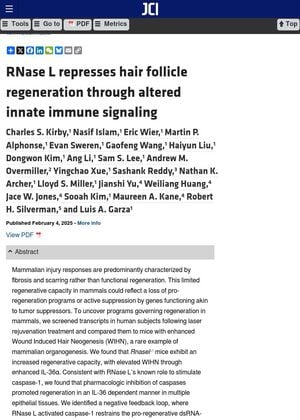RNase L Represses Hair Follicle Regeneration Through Altered Innate Immune Signaling
February 2025
in “
Journal of Clinical Investigation
”

TLDR RNase L hinders hair growth by altering immune signals.
The study explores the role of RNase L in hair follicle regeneration, identifying it as a repressor gene that affects regeneration by altering immune signaling. In both human subjects and Rnasel-/- mice, the absence of RNase L was found to enhance regenerative capacity through increased Wound Induced Hair Neogenesis (WIHN) and elevated IL-36α levels. The research describes a negative feedback loop where RNase L activates caspase-1, which limits pro-regenerative dsRNA-TLR3 signaling by cleaving the toll-like adaptor protein TRIF. Inhibiting caspases pharmacologically was shown to promote regeneration in an IL-36 dependent manner across various epithelial tissues. The study suggests that RNase L balances immune activation during viral infections but at the cost of inhibiting regeneration, indicating potential therapeutic strategies for hair growth and hair loss conditions.
